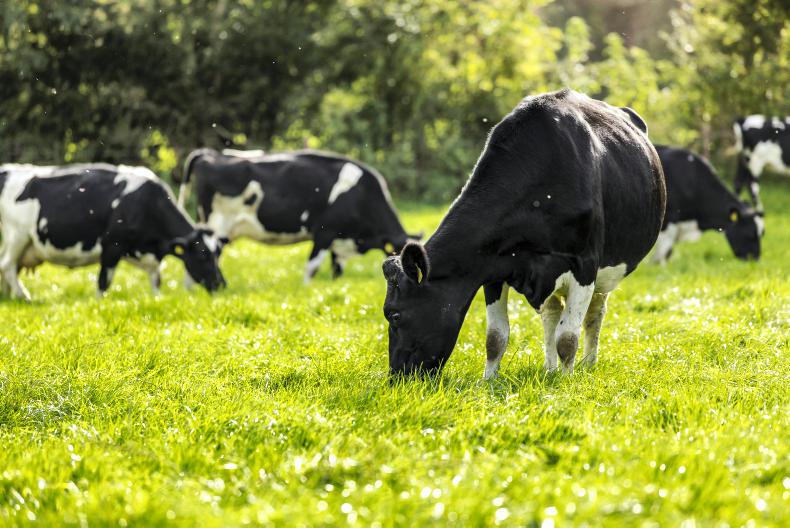Counties that have seen the greatest level of dairy intensification will face tougher nitrates rules in the coming years, a Department of Agriculture official has warned.
Senior Department inspector Jack Nolan said dairy expansion in counties Cork, Tipperary, and Kilkenny has had an impact on water quality.
“People might say that 20 years ago we had the same number of stock, and we did, but they weren’t all localised, or in the Golden Vale, or the southeast of the country,” Nolan told a Fertilizer Association of Ireland webinar on Tuesday.
“And when we take actions in the future these actions will have to be targeted. There’s no point in asking somebody up in Roscommon or Mayo to cut back on fertiliser.”
He identified an area running from Meath down through Kildare and Laois, into all of the southeast, south Tipperary, and to Cork’s border with Kerry.
I don’t know about the part of the country you’re in but where I was, there was an awful lot of slurry being spread over the closed period
Nolan said: “If we look at nitrogen sales, they’ve increased over the last couple of years and they haven’t increased uniformly across the country. We know that we have legal limits for nitrogen and phosphorous and the majority of people comply with them, but some don’t.
“What’s being investigated at the moment is the possibility of a chemical fertiliser register. So that when a farmer buys fertiliser it will be linked to his herd number.”
Along with a watchful eye on what farmers are purchasing, Nolan hinted at lower spreading limits. “Everyone should be trialling a reduction in nitrogen this year because next year, not to pre-empt the nitrates review, but there will be a reduction in nitrate allowances.”
Farmers mishandling slurry are also on the Department’s watchlist.
“I don’t know about the part of the country you’re in but where I was, there was an awful lot of slurry being spread over the closed period,” Nolan said.
“This points to a major issue with slurry storage – that we’ve had an expansion in animal numbers, but now people didn’t invest in the tanks so they’re dumping the slurry.”
Read more
Nitrates loss is incredibly complex and not simply down to higher stocking rates
Stricter nitrates rules to apply to more farms from January
Counties that have seen the greatest level of dairy intensification will face tougher nitrates rules in the coming years, a Department of Agriculture official has warned.
Senior Department inspector Jack Nolan said dairy expansion in counties Cork, Tipperary, and Kilkenny has had an impact on water quality.
“People might say that 20 years ago we had the same number of stock, and we did, but they weren’t all localised, or in the Golden Vale, or the southeast of the country,” Nolan told a Fertilizer Association of Ireland webinar on Tuesday.
“And when we take actions in the future these actions will have to be targeted. There’s no point in asking somebody up in Roscommon or Mayo to cut back on fertiliser.”
He identified an area running from Meath down through Kildare and Laois, into all of the southeast, south Tipperary, and to Cork’s border with Kerry.
I don’t know about the part of the country you’re in but where I was, there was an awful lot of slurry being spread over the closed period
Nolan said: “If we look at nitrogen sales, they’ve increased over the last couple of years and they haven’t increased uniformly across the country. We know that we have legal limits for nitrogen and phosphorous and the majority of people comply with them, but some don’t.
“What’s being investigated at the moment is the possibility of a chemical fertiliser register. So that when a farmer buys fertiliser it will be linked to his herd number.”
Along with a watchful eye on what farmers are purchasing, Nolan hinted at lower spreading limits. “Everyone should be trialling a reduction in nitrogen this year because next year, not to pre-empt the nitrates review, but there will be a reduction in nitrate allowances.”
Farmers mishandling slurry are also on the Department’s watchlist.
“I don’t know about the part of the country you’re in but where I was, there was an awful lot of slurry being spread over the closed period,” Nolan said.
“This points to a major issue with slurry storage – that we’ve had an expansion in animal numbers, but now people didn’t invest in the tanks so they’re dumping the slurry.”
Read more
Nitrates loss is incredibly complex and not simply down to higher stocking rates
Stricter nitrates rules to apply to more farms from January







 This is a subscriber-only article
This is a subscriber-only article










SHARING OPTIONS: